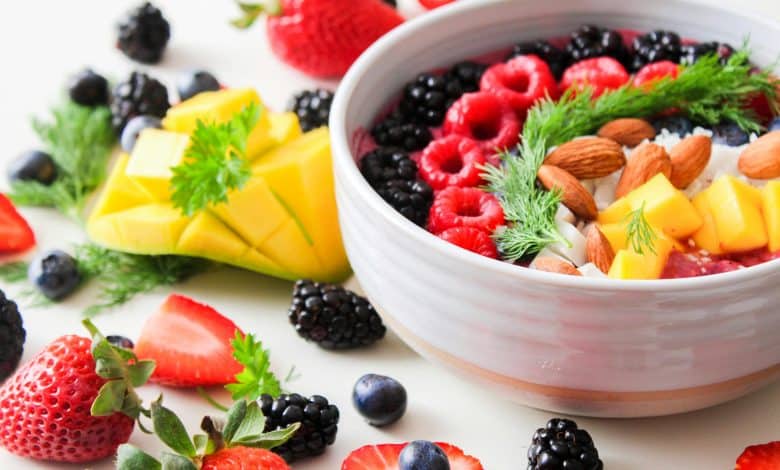The Ultimate Guide to a High-Fiber and Diet High-Protein Diet
Deprecated: preg_split(): Passing null to parameter #3 ($limit) of type int is deprecated in /home/dailwtkh/public_html/wp-content/themes/jannah/framework/functions/post-functions.php on line 863

Thinking of initiating yourself into a fitness regime? A high-protein and high-fiber diet will help appetite, resulting in weight loss due to the higher protein level.
Diet is an important part of fitness and health equipment since it serves as the foundation of any routine. In a fitness diet comparison, the high-protein diet is recommended first since it is inclusive and shows results in weight loss, muscle building, and physical activity.
A healthy diet offers many benefits for both physical and mental health.
This blog post will discuss healthy diet fundamentals, nutrition, and the benefits of a high-protein, and high-fiber diet.
What is considered a healthy diet?
A healthy diet supplies the body with all of the essential nutrients, vitamins, and minerals that are required for the performance of surgical procedures, provided that the patient does not suffer from chronic conditions. As a result, the idea of a perfect meal that is both balanced and healthful may also include several different foods and variations that come from all of the essential nutritional groups.
Here are the primary elements that make up a healthy diet:
- Fruits and Vegetables: Try to consume colored fruits and vegetables because these colors contain different nutrients. Daily one should attempt at least 5 portions of fruits and vegetables.
- Whole Grains: Grains have higher amounts of fiber and better balance nutritionally. Some are; brown rice, quinoa, and muesli. I have a gluten intolerance problem; however, I can take einkorn pasta and sourdough rarely.
- Lean Proteins: Consume poultry, fish both fresh water and sea as well as lean meats, organic soybeans, beans, and legumes.
- Healthy fats: Monounsaturated and polyunsaturated fats should be taken. Choose products that are rich in Omega-3’s including olive oil, avocados, nuts, and seeds.
- Portion Control: It is also essential to ensure the right portions are taken to avoid the implication of eating healthy as a way of putting on more weight. I’ll talk about this below, as a part of the strategies on how to construct a healthy plate.
Benefits of a High Fiber Diet
Fiber is an important nutrient and consuming fiber has several health benefits. Here are some main benefits of incorporating a proper amount of fiber in your diet:
1. Digestive Health
Fiber adds more mass to the fecal matter, making it softer and easier to pass; thus, it helps in avoiding constipation, diverticulitis, and hemorrhoids.
2. Weight management and appetite health
It has been discovered that products that contain fiber are very filling, therefore they assist in dealing with hunger, especially appetite suppression, which may support your intention of losing weight. Low-energy-dense foods are beneficial in weight control; therefore, frequent consumption of fruits and vegetables supports that.
3. Blood Sugar Control
Harvard researchers reveal that soluble fiber which is found in oats, beans, and some fruits decreases the rate at which glucose is absorbed into the bloodstream.
4. Heart Health
Fiber can help lower cholesterol and one’s blood pressure since it binds to it and passes out of the body. A diet high in fiber may also lower blood pressure While most meals involve consuming moderate to high amounts of DIETARY FIBER. I also decreased my DIETARY FIBER intake at breakfast and dinner with the consistently high-fiber lunch. This, in turn, may decrease the risk of heart disease.
5. Prevention of Certain Diseases
Some of the improvement can be attributed to the intake of an adequate portion of fiber which is said to reduce the occurrence of colorectal cancer as well as type 2 diabetes.
To gain the advantages of using fiber, one should consume foods that contain fiber including fruits, vegetables, whole grains, nuts, and legumes. In addition, it is essential to note that water plays a crucial role in enhancing the work of fiber in the process of digestion.
What is the recommended amount of fiber?
From U.S. Dietary Guidelines for American Trusted Source fiber recommendations are:
- Women under 50: 25 to 28 grams per day
- Men under 50: 31 to 34 grams per day
- Women 51 and older: 22 grams per day
- Men 51 and older: 28 grams per day
Be advised against consuming a high-fiber diet if you have irritable bowel syndrome, ulcerative colitis, or Cohn’s disease.
Benefits of High Protein Diet
Proteins are essential in the building of muscles and weight loss.
1. Muscle Building
Protein builds and repairs muscular tissue. When you exercise, microscopic tears occur in your muscles. Protein helps repair the tears and build new muscle tissue. Enough protein means that your body will improve and increase new muscles, which hinders your progress.
Protein promotes anabolic growth of the muscle due to the amino acids that are provided in executing protein synthesis. Protein eaten after a workout serves proper muscle growth and recovery.
2. Weight Loss
Protein is also necessary for weight loss because it aids in digestion, and also, relieves hunger. Precisely, a high-protein diet also helps in increasing metabolic rate to burn calories throughout the day.
3. Lower the Risk of Type 2 Diabetes
Insulin sensitivity can be improved with dietary proteins incorporated with resistance training and reduce the probability of type 2 diabetes. The addition of protein to the meals that one takes assists in maintaining steady levels of blood sugar.
4. Healthy Bones
Protein also has an impact on the bones where it helps in the absorption of calcium hence reducing the rate of osteoporosis. An individual’s need for proteins depends on the person’s age, weight, level of activity or exercise, and general health.
Several dieting routines should be discussed with a doctor before starting, the high-protein diet. Also, to get enough proteins, the food nutrients should come from different sources like lean meats, poultry, fish, dairy, eggs, beans, and plant sources.
Note: Ahigh-protein diet is not advisable for people who have issues with their kidneys. Also, people suffering from heart-related issues, or high cholesterol levels need to be careful while they eat protein-coupled foods.
Examples of supplements
- Protein powders
- Creatine (amino acids)
- Pre& Post workout supplements
- Multivitamins
- Omega-3
- D Magnesium
Remember, having a good, healthy diet—from sources of protein, fruits, vegetables, whole grains, and healthy fats is as important as just taking protein. Consult a registered dietitian or healthcare provider about meal planning and protein intake
Note: Whole foods should always be the core of your diet, and supplements should only be used when supporting your diet.
Wrap Up:
High protein diet fitness and high fiber diet is an effective way to increase muscle mass and lose fat in addition to supporting one’s health. Thus, knowing about the role of proteins, alternative appropriate sources, and considering the macronutrient ratios, you’ll achieve the desired outcomes in fitness. Whether you are an athlete a fitness freak or a simple man/woman aspiring to be fit and fine, going for a high-protein diet and high-fiber diet is beneficial.
Do not forget to pay attention to the signals your body gives, drink water, and of course, do not forget about the physical activity alongside your diet.



